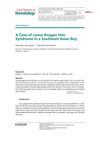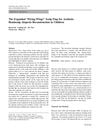 3 citations,
November 2021 in “Frontiers in Genetics”
3 citations,
November 2021 in “Frontiers in Genetics” Certain genes are linked to the quality of cashmere in goats.
 34 citations,
May 2021 in “Journal of Nanobiotechnology”
34 citations,
May 2021 in “Journal of Nanobiotechnology” The 3D electrospun fibrous sponge is promising for tissue repair and healing diabetic wounds.
 September 2022 in “Dermatology and therapy”
September 2022 in “Dermatology and therapy” Contact immunotherapy might help treat various skin conditions, but more research is needed to confirm its safety and effectiveness.
 3 citations,
September 2022 in “Frontiers in veterinary science”
3 citations,
September 2022 in “Frontiers in veterinary science” Melatonin affects cashmere growth in goats by influencing stem cell and certain signaling pathways.
 September 2023 in “Cureus”
September 2023 in “Cureus” Early recognition and treatment of atypical alopecia areata in infants are crucial.
 37 citations,
April 2019 in “Journal of The American Academy of Dermatology”
37 citations,
April 2019 in “Journal of The American Academy of Dermatology” Some treatments like intralesional steroids and 5α-reductase inhibitors are effective for frontal fibrosing alopecia, but more research is needed.
 1 citations,
July 2019 in “Case reports in dermatology”
1 citations,
July 2019 in “Case reports in dermatology” A Thai boy was diagnosed with a rare hair disorder causing hair thinning and shedding.
75 citations,
September 2015 in “Acta biomaterialia” Alkylation of human hair keratin allows for adjustable drug release rates in hydrogels for medical use.
 17 citations,
February 2020 in “Journal of Pediatric and Adolescent Gynecology”
17 citations,
February 2020 in “Journal of Pediatric and Adolescent Gynecology” Early medical support for transgender youth is important for their health, with low regret for gender-affirming hormone use and a need for knowledgeable care providers.
 3 citations,
September 2016 in “Natural Product Communications”
3 citations,
September 2016 in “Natural Product Communications” Germacrene analogs, especially 8-Hydroxy germacrene B, are more effective than germacrone at blocking a hormone-related enzyme and could help treat hair loss.
 40 citations,
April 2014 in “Genes & Development”
40 citations,
April 2014 in “Genes & Development” Hormones during pregnancy and lactation keep skin stem cells inactive, preventing hair growth.
 27 citations,
January 2017 in “Neuropsychopharmacology”
27 citations,
January 2017 in “Neuropsychopharmacology” The enzyme 5α-reductase is key in causing psychotic-like effects from sleep deprivation.
 November 2024 in “Frontiers in Medicine”
November 2024 in “Frontiers in Medicine” Cirrhosis affects quality of life with various symptoms, requiring a holistic, multidisciplinary approach for management.
 November 2024 in “BMC Research Notes”
November 2024 in “BMC Research Notes” SIRT3 and SIRT7 genes may play a role in hair loss.
 August 2016 in “Journal of Dermatology”
August 2016 in “Journal of Dermatology” A chemical called 5-Bromo-2′-deoxyuridine caused rapid hair loss in mice by killing certain skin cells through a specific cell death pathway.
 5 citations,
January 2013 in “Journal der Deutschen Dermatologischen Gesellschaft”
5 citations,
January 2013 in “Journal der Deutschen Dermatologischen Gesellschaft” The document concludes that individualized treatment for malignant epithelial tumors is necessary and more research on metastatic squamous cell carcinoma treatments is needed.
 August 2022 in “International journal of research in pharmacy and chemistry”
August 2022 in “International journal of research in pharmacy and chemistry” Teak is a durable, termite-resistant wood with medicinal benefits.
 134 citations,
June 2005 in “Neuropsychopharmacology”
134 citations,
June 2005 in “Neuropsychopharmacology” GABRA2 gene variations impact alcohol response, and hair loss medication finasteride reduces some effects.
 22 citations,
September 2015 in “Fertility and Sterility”
22 citations,
September 2015 in “Fertility and Sterility” The oral glucose tolerance test is effective in detecting abnormal glucose tolerance in Indian women with PCOS.
 8 citations,
March 2009 in “Aesthetic Plastic Surgery”
8 citations,
March 2009 in “Aesthetic Plastic Surgery” The "flying-wings" scalp flap technique is a simple, safe, and effective way to reconstruct large areas of scalp loss in children.
 October 2023 in “IntechOpen eBooks”
October 2023 in “IntechOpen eBooks” Genes and epigenetic changes are important in the development of Polycystic Ovary Syndrome.
 November 2024 in “Clinical Cosmetic and Investigational Dermatology”
November 2024 in “Clinical Cosmetic and Investigational Dermatology” Rosemary oil may effectively treat hair loss with fewer side effects, but more research is needed.
 4 citations,
January 2019 in “Annals of Dermatology”
4 citations,
January 2019 in “Annals of Dermatology” Higher levels of MiR-92a-1-5p and miR-328-3p found in female hair loss patients.
 16 citations,
June 2019 in “International Journal of Women's Dermatology”
16 citations,
June 2019 in “International Journal of Women's Dermatology” Type 2 diabetes may increase the risk of severe hair loss in African American women.
 18 citations,
July 2019 in “Clinical Endocrinology”
18 citations,
July 2019 in “Clinical Endocrinology” Women with PCOS in Sicily show different levels of metabolic problems depending on their PCOS type, with obesity and abnormal lipid profiles being common.
 August 2021 in “Annals of Agricultural and Environmental Medicine”
August 2021 in “Annals of Agricultural and Environmental Medicine” The article concludes that understanding Frontal Fibrosing Alopecia (FFA) is crucial for effective treatment, which includes medication like 5α-reductase inhibitors and hydroxychloroquine.
 June 2024 in “Journal of Education, Health and Sport”
June 2024 in “Journal of Education, Health and Sport” Androgenetic alopecia can be treated with minoxidil and finasteride, requiring long-term use and patient cooperation.
 3 citations,
June 2016 in “Dermatology Reports”
3 citations,
June 2016 in “Dermatology Reports” Finger length ratios don't predict baldness in men.
 April 2021 in “IntechOpen eBooks”
April 2021 in “IntechOpen eBooks” Androgens, male hormones, affect physical and mental functions, with a decrease leading to health issues like muscle loss, bone disease, and depression, and more research is needed on long-term effects and treatments.
 12 citations,
March 2017 in “Medicinal Chemistry Research”
12 citations,
March 2017 in “Medicinal Chemistry Research” Some curcumin-like compounds can effectively and safely block the enzyme linked to hair loss and other conditions related to male hormones.





























